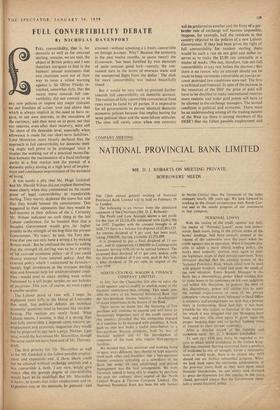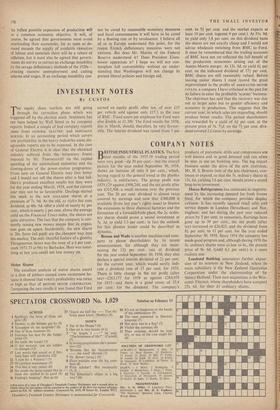FULL CONVERTIBILITY DEBATE
By NICHOLAS DAVENPORT FULL convertibility, that is, for domestic as well as for external sterling, remains, we are told, the object of British policy and I was therefore intrigued to find in the bankers' annual statements that two chairmen went out of their way to issue a veiled warning against it. Sir Oliver Franks re- marked, somewhat slyly, that the recent move towards full con- vertibility did not commit us to any new policies or impose any major restraint on our freedom of action 'over and above that which is always implicit in the need to have re- gard, in our own interests, to the soundness of the currency,' and then went on to point out that our reserves, even after their recovery, were still 'far short of the desirable level, especially when allowance is made for our short-term liabilities.' Lord Monckton more bluntly declared that the approach to full convertibility for domestic sterl- ing might well prove to be prolonged 'since it implies the working out of a practical reconcilia- tion between the maintenance of a fixed exchange parity in a free market and the pursuit of a domestic policy aiming at a high level of employ- ment and continuous improvement of the standard of living.'
It was surely a pity that Mr. Hugh Gaitskell and Mr. Harold Wilson did not explain themselves more clearly when they commented on the recent grant of legal convertibility to transferable sterling. They merely deplored the move but said that they would honour the commitment. This suggested to their opponents that they would be half-hearted in their defence of the £. Certainly Mr. Wilson indicated no such thing at the last Labour conference, for he boasted then that a Socialist Government would give ,far higher priority to the strength of sterling than the present Government. 'We reject,' he said. 'the Tory doc- trine that you can only have a strong £ by making Britain weak.' But he confused the issue by adding that the strength of sterling was to he a priority of his external economic policy—as if you could divorce external front internal policy. And the external policy which I understand he favours— namely high investment in the overseas sterling area and financial help for underdeveloped coun- tries—would tend to make sterling weak unless buttressed by a still larger surplus on our balance of payments. This year, of course, we must expect a smaller surplus.
The Labour point of view will, I hope, be explained more fully in the House of Commons this week, but political debates pn technical economic questions tend to become like shadow- boxing. The realities are rarely faced. What Labour means, I assume, is that if a strong, free and fully convertible depends upon massive un- employment and economic stagnation they would not be prepared to pay such a price. Neither, I am sure, would the Keynesian Mr, Macmillan. though the same could not have been said of Mr. Thorney- croft.
The first priority for Mr. Macmillan as well as for Mr. Gaitskell is the fullest possible employ- ment and expansion and, if these ideals could not be attained without exchange controls. and a less convertible both, I am sure, would give notice that the present .degree of convertibility would have to be modified.. But Mr. Macmillan is lucky; he knows that fuller employment and re- expansion can, at the moment, be pursued—and
attained—without upsetting a £ freely convertible on foreign account. Why? Because the economy in the past twelve months, to quote merely the Economist, 'has been fortified by two elements of quite unusual good luck—namely, the con- venient turn in the terms of overseas trade and the unexpected flight from the dollar.' The dash for more convertibility was indeed beautifully timed.
But it would be very rash to proceed further towards full convertibility on domestic account. The realities of fully convertible currencies at fixed rates must be faced by all parties. It is impossible for all governments to pursue identical domestic economic policies because that implies having the same political ideas and the same labour attitudes. The time will surely come when one currency
will be preferred to another and the fixity of a par- ticular rate of exchange will become impossible. Suppose, for example, half the residents in this country objected to the policies of a new Labour Government. If they had been given the right of full convertibility for resident sterling there would be such a run on our gold and dollar. re- serves as to make the $2.80 rate untenable in a matter of weeks. (We can, therefore, rule out full convertibility at any rate before the election.) But there is no reason why an attempt should not be made to keep currencies convertible on foreign ac- count provided two conditions were met. The first is technical and financial. In spite of the increase in the resources of the IMF the price of gold will have to be doubled to make international reserves more realistic and wider gold points will have to be allowed to the exchange managers. The second condition is political and economic. There must be an understanding among all the trading nations of the West (as there is among members of the OEEC) that the fullest possible employment and he fullest possible expansion of production will 3e a common economic objective. It will, of course, be agreed that governments must avoid overloading their economies, for as soon as de- mand exceeds the supply of available resources of labour and materials there will be a return of inflation, but it must also be agreed that govern- ments do not try to correct an exchange instability by the savage deflationary methods of the 1920s- creating massive unemployment and cutting salaries and wages. If an exchange instability can-
not be cured by reasonable monetary measures and fiscal commonsense it will have to be cured by a floating rate or by revaluation. I believe all of us in Europe understand this point, for the recent French .deflationary measures were not extreme. But does Mr. Martin of the Federal Reserve understand it? Does President Eisen- hower appreciate it? I hope we will not con- template full convertibility without an under- standing that Washington will not change its present liberal policies and foreign aid.











































 Previous page
Previous page